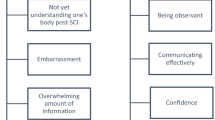Abstract
Study design:
Cross-sectional, focus group.
Objectives:
To explore positive and negative issues reported by family caregivers of people with spinal cord injury (SCI) to develop a relevant and valid tool to assess caregiver distress and benefit for this unique population.
Methods:
Seventy-three family caregivers of people with SCI participated in 16 focus groups. We audio-recorded all focus group discussions and transcribed the recordings verbatim. Qualitative analysis of the transcripts was performed to identify major themes and subthemes relating to family caregiving activities.
Results:
Positive themes were disproportionately limited in comparison with negative themes. Positives included changes in self-awareness, enhanced family cohesiveness and feeling appreciated. Negative themes included physical and emotional strain, dissatisfaction with hired carers and strain on family relationships. Health-related themes included fatigue and lack of sleep. Caregivers identified sources of strength that helped them manage stresses including faith and support from friends and co-workers.
Conclusion:
The numerous themes help lay the groundwork to develop a valid and reliable assessment tool to assist health-care providers in treatment planning and the provision of long-term assistance to people with SCI by enhancing areas of strengths and addressing factors that contribute to burden and distress for family caregivers.
Similar content being viewed by others
Log in or create a free account to read this content
Gain free access to this article, as well as selected content from this journal and more on nature.com
or
References
Decker SD, Schultz R, Wood D . Determinants of well-being in primary caregivers of spinal cord injured persons. Rehabil Nurs 1989; 14: 6–8.
Hoffman GJ, Lee J, Mendez-Luck CA . Health behaviors among Baby Boomer informal caregivers. Gerontologist 2012; 52: 219–230.
Beneken G, Kolmer D, Tellings A, Gelissen J, Garretsen H, Bongers I . Ranked motives of long-term care providing family caregivers. Scand J Caring Sci 2008; 22: 29–39.
Schulz R, Tompkins CA, Rau MT . A longitudinal study of the psychosocial impact of stroke on primary support persons. Psychol Aging 1988; 3: 131–141.
Visser-Meily JM, Post MW, Riphagen II, Lindeman E . Measures used to assess burden among caregivers of stroke patients: a review. Clin Rehabil 2004; 18: 601–623.
Family Caregiver Alliance Selected Caregiver Assessment Measures: A Resource Inventory for Practitioners, 2nd edn. The National Center on Caregiving. 2012. https://www.caregiver.org/sites/caregiver.org/files/pdfs/SelCGAssmtMeas_ResInv_FINAL_12.10.12.pdf.
QSR International. NVivo. Qualitative Data Analysis Software (Version 8), 2nd edn. QSR International PTY Ltd. 2012.
Strauss A, Corbin JM . Basics of Qualitative Research: Techniques and Procedures for Developing Grounded Theory, 2nd edn., Sage Publications: London. 1998.
Adelman RD, Tmanova LL, Delgado D, Dion S, Lachs MS . Caregiver burden: a clinical review. JAMA 2014; 311: 1052–1060.
Chan RC . Stress and coping in spouses of persons with spinal cord injuries. Clin Rehabil 2000; 14: 137–144.
Chandler M, Kennedy P, Sandhu N . The association between threat appraisals and psychological adjustment in partners of people with spinal cord injuries. Rehabil Psychol 2007; 52: 470–477.
Rodakowski J, Skidmore ER, Rogers JC, Schulz R . Role of social support in predicting caregiver burden. Arch Phys Med Rehabil 2012; 93: 2229–2236.
Ellenbogen PS, Meade MA, Jackson MN, Barrett K . The impact of Spinal Cord Injury on the employment of family caregivers. J Vocat Rehabil 2006; 25: 35–44.
van Exel J, Moree M, Koopmanschap M, Goedheijt TS, Brouwer W . Respite care—an explorative study of demand and use in Dutch informal caregivers. Health Policy 2006; 78: 194–208.
Samsa GP, Hoenig H, Branch LG . Relationship between self-reported disability and caregiver hours. Am J Phys Med Rehabil 2001; 80: 674–684.
Poulin MJ, Brown SL, Ubel PA, Smith DM, Jankovic A, Langa KM . Does a helping hand mean a heavy heart? Helping behavior and well-being among spouse caregivers. Psychol Aging 2010; 25: 108–117.
Dickson A, O'Brien G, Ward R, Allan D, O'Carroll R . The impact of assuming the primary caregiver role following traumatic spinal cord injury: An interpretative phenomenological analysis of the spouse's experience. Psychol Health 2010; 25: 1101–1120.
Magliano L, Patalano M, Sagliocchi A, Scutifero M, Zaccaro A, D'Angelo MG et al. ‘I have got something positive out of this situation’: psychological benefits of caregiving in relatives of young people with muscular dystrophy. J Neurol 2014; 261: 188–195.
Elliott TR, Berry JW . Brief problem-solving training for family caregivers of persons with recent-onset spinal cord injuries: a randomized controlled trial. J Clin Psychol 2009; 65: 406–422.
Acknowledgements
We thank all participants and the research staff at the collaborating centers for their assistance. This study was funded by the National Institute on Disability and Rehabilitation Research, US Department of Education, Grant #H133G090013.
Author information
Authors and Affiliations
Corresponding author
Ethics declarations
Competing interests
The authors declare no conflict of interest.
Rights and permissions
About this article
Cite this article
Charlifue, S., Botticello, A., Kolakowsky-Hayner, S. et al. Family caregivers of individuals with spinal cord injury: exploring the stresses and benefits. Spinal Cord 54, 732–736 (2016). https://doi.org/10.1038/sc.2016.25
Received:
Revised:
Accepted:
Published:
Issue date:
DOI: https://doi.org/10.1038/sc.2016.25
This article is cited by
-
Correlations between ADL in patients with SCI and caregiver burden, quality of life, and presenteeism in South Korea
Scientific Reports (2024)
-
Labor market costs for long-term family caregivers: the situation of caregivers of persons with spinal cord injury in Switzerland
BMC Health Services Research (2023)
-
Environmental and systems experiences of persons with spinal cord injury and their caregivers when transitioning from acute care to community living during the COVID-19 pandemic: a comparative case study
Spinal Cord Series and Cases (2023)
-
Self-Efficacy and Psychological Well-Being of Family Caregivers of Persons with Spinal Cord Injury
Psychological Studies (2022)
-
Is caregiver quality of life predicted by their perceived burden? A cross-sectional study of family caregivers of people with spinal cord injuries
Spinal Cord (2021)



